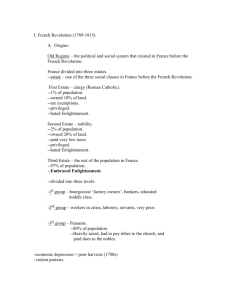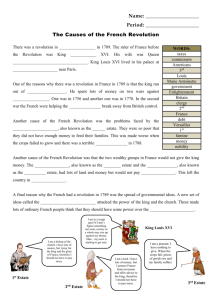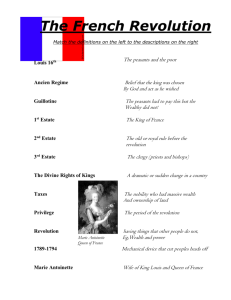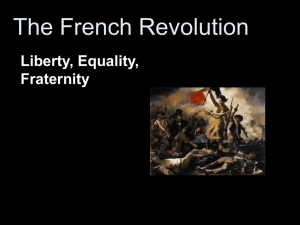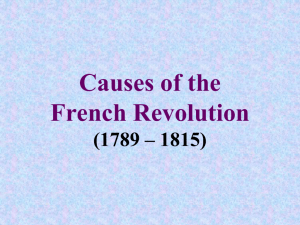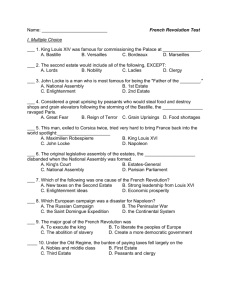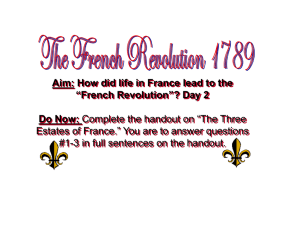French Revolution
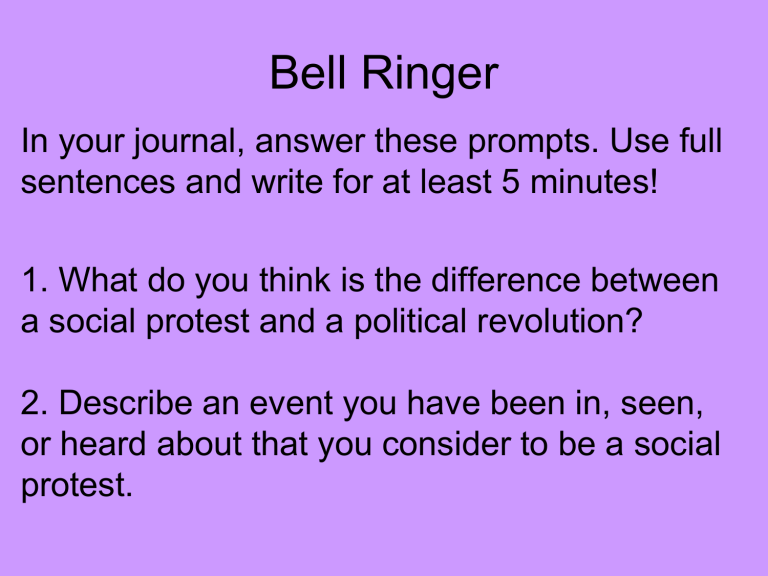
Bell Ringer
In your journal, answer these prompts. Use full sentences and write for at least 5 minutes!
1. What do you think is the difference between a social protest and a political revolution?
2. Describe an event you have been in, seen, or heard about that you consider to be a social protest.
Revolutions
&
Unifications
Unpopular Rule
We Don’t Like You!
Enlightenment Ideas
There are New & Better Ways
Economic Distress
Money Problems
Social Injustice
Being unfair to a group of people
Religious Intolerance
Being unfair to a religious group
Nationalism
We are the BEST!
Today in class …
We will…
Explain the causes and major events of the French Revolution in 1789.
You will be able to…
Social Studies
- Analyze the differences in social classes before the French Revolution.
- Identify key events of the French
Revolution:
•National Assembly & Tennis Court
Oath
•Storming of the Bastille
•Great Fear
•Declaration of the Rights of Man and
Citizen
NEXT TIME/SOON:
Language
- Define: Estate, Bastille, Clergy
- Describe images of the French
Revolution.
What do you see?
What do you see?
July 14, 1789
What do you see?
What do you see?
What do you see?
RevolutionS & Unifications
Vocabulary
1. Estates
2. Bastille
3. Clergy
4.
Coup d’etat
5. Balance of Power
6. Nation-state
7. Nationalism
8. Creole
9. Mulatto
10.Mestizo
11.Viceroy
12.Realpolitik
Estates - Social classes in France before the
French Revolution
Bastille - French prison
Clergy - Leaders of the Roman Catholic
Church (the First Estate)
Louis XVI
Causes of the French Revolution
1. The Enlightenment
2. Influence of the
American
Revolution
3. Outdated Class
System
4. Failing Economy
5. King Louis XVI
6. Peasants’ Situation is Unbearable
7. Harvest Failures
1. The Enlightenment
Liberty (freedom)
Equality (fair treatment for all)
Reason
John Locke’s ideas: Government that protects natural rights, especially the right to property
Voltaire attacked noble’s privileges and the Church's authority
What kind of government did Locke,
Montesquieu, Voltaire, and Jefferson
NOT like?
2. Influence of the American Revolution
American Revolution (1775 to 1783)
Enlightenment ideas in action
France helped the Colonies
Put Louis XVI in debt
3. Outdated Class System
First Estate: Clergy (ex. Catholic priest)
Second Estate: Nobles
(Rich upper class people)
Third Estate : Peasants (98% of the people were in this class)
4. Failing Economy
National Debt = 4 billion Livres
($5.6 billion in 1980 dollars!)
Inefficient and uneven tax system
Varied as to what region you lived in and what estate you were in
5. King Louis XVI &
Queen Marie-Antoinette
He was a weak King
Indecisive
Marie-Antoinette was allowed “to dispense patronage amongst friends.”
6. Peasants Situation was Unbearable
Peasants were …
Overtaxed
Land-starved
Subsistence farmers
Paid half of their income to taxes
7. Harvest Failures
Failures from 1787 to 1788
Less food available
Higher prices
Businesses failed
Unemployment in the cities
Unpopular Rule
We Don’t Like You!
Enlightenment Ideas
There are New & Better Ways
Economic Distress
Money Problems
Social Injustice
Being unfair to a group of people
Religious Intolerance
Being unfair to a religious group
Nationalism
We are the BEST!
• French Revolution Movie w/Questions
EVENTS OF THE FRENCH
REVOLUTION
1789
1. Outbreak of Revolution
Money problems forced Louis XVI to call the Estates-General into session.
Each Estate could caste ONE vote.
Main disagreement: Representation
– Should the estates vote by estate or by individual?
2. National Assembly
June 1789: The delegates of the Third Estate declared themselves to be a National Assembly.
This was the beginning of a representative government in France.
Abbe Sieyes – “What is the Third Estate?
Everything!”
3. Tennis Court Oath
The National Assembly met in a tennis court after being locked out of their meeting room.
They promised to make a new constitution:
Tennis Court Oath.
Louis ordered the First and Second Estates to join the National Assembly.
Rumors started that Louis had ordered foreign soldiers to attack the French citizens.
4. Storming the Bastille
July 14, 1789: an angry mob stormed a
French prison to get gunpowder for their weapons in order to defend the city.
What American holiday is similar to
July 14, “Bastille Day?
July 14, 1789
5. The Great Fear
A Great Fear swept through the country
– Peasants broke into and burned nobles’ houses
– Peasants tore up documents that forced them to pay fees to nobles
Late 1789, a mob of women marched to the
Palace of Versailles and forced King Louis
XVI and Marie Antoinette to come to Paris.
6. Declaration of the Rights of Man and of the Citizen: August 26, 1789
National Assembly abolished (got rid of) all noble privileges
Declaration of the Rights of Man and of the Citizen
Declared Natural Rights:
– Private property, liberty, security, and resistance to oppression
Declared freedom of speech, religious toleration, and liberty of the press.
Worksheet
1. Complete the back of the worksheet.
2. Look at the images from the beginning of class.
– You should NOW be able to identify several images!
